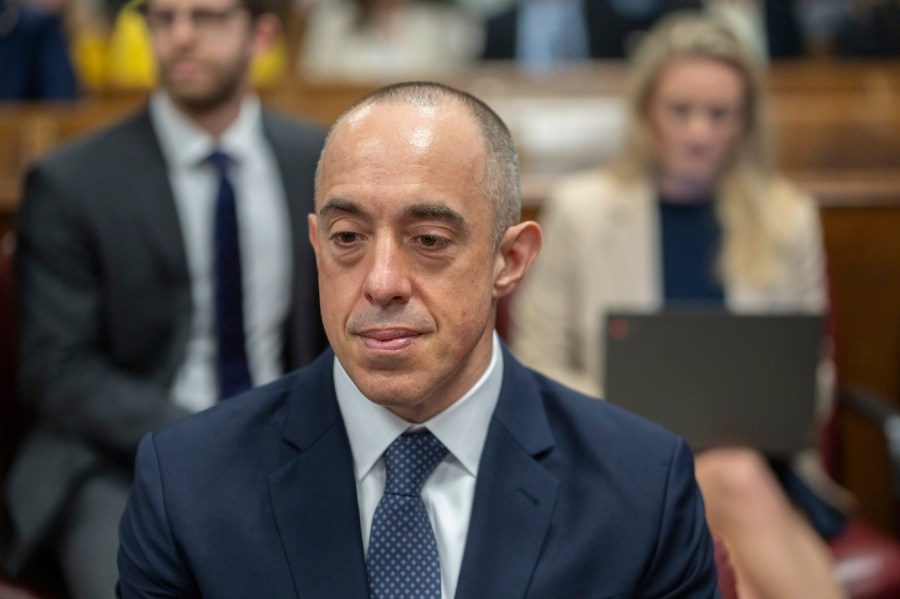
Acting Deputy Attorney General Emil Bove ordered career prosecutors earlier this month to sign a motion to dismiss the bribery case against New York City Mayor Eric Adams, accused of corruptly approving permits for a new Turkish consulate in Manhattan.
The indictment, filed in September 2024, “improperly interfered” with Adam’s reelection campaign, Bove’s motion stated. Moreover, “the pending prosecution has unduly restricted Mayor Adams’ ability to devote his full attention and resources to the illegal immigration and violent crime that escalated under the policies of the prior administration.”
Bove’s motion did not address the evidence against Adams. Bove restored the security clearance of the mayor, who had dined with President-Elect Trump at Mar-a-Lago in January and was a guest at the inauguration. Perhaps to ensure that Adams continued to comply with the wishes of the administration, however, Bove left open the possibility that the Department of Justice might reinstate the charges at a later date.
Within a few days, seven lawyers connected to the case refused to sign the motion and resigned.
Here are profiles of the two prosecutors who have explained their decisions to the public. The warnings issued by these talented professionals, neither of whom is a Democrat, about the imminent danger posed to the rule of law by abject loyalty to the Trump administration and weaponization of the Department of Justice are too important to disappear into the rapid news cycle.
Danielle Sassoon, appointed interim head of the U.S. Attorney’s Office in Manhattan by President Trump soon after his second term began, indicated that she was “baffled” by the process that led to Bove’s decision. Sassoon revealed that during a meeting with Justice Department officials in January, Adams’s lawyers “repeatedly urged what amounted to a quid pro quo” — cooperation with the Trump administration’s immigration policies in New York City in exchange for dismissal of the charges. When the meeting ended, Bove ordered Justice Department lawyers to give him the notes they had taken.
Rewarding Adams’s “opportunistic and shifting commitments,” Sassoon declared, would “set a breathtaking and dangerous precedent.” Dismissing the case, “will amplify rather than abate concerns about weaponization of the department,” especially when investigators also believe that the mayor had destroyed evidence and provided false statements to the FBI. Signing the motion, Sassoon added, would prevent her from “credibly representing the government before the courts.”
Sasson is a graduate of Harvard University and Yale Law School and a member of the conservative Federalist Society. She clerked for several conservative judges, including Supreme Court Justice Antonin Scalia, who, she recalled, “thickened my skin.” As a prosecutor in the U.S. Attorney’s Office in the Southern District of New York, she received accolades for her withering four-hour cross-examination of Sam Bankman-Fried, founder of the FTX cryptocurrency company, who was found guilty and sentenced to 25 years in prison.
Sassoon, it is worth noting, criticized in a Wall Street Journal opinion essay President Biden’s commutation of the sentences of 2,500 “supposedly non-violent offenders” without consulting prosecutors or judges. Sassoon wrote, “At this time of transition, I look forward to doing my part to ensure that prosecutors can resume their noble work unimpeded, outside the limelight and in service of the public.”
For the foreseeable future, it appears that Sassoon, who is 38-years old, will not be able to realize those aspirations.
Hagan Scotten, an assistant U.S. Attorney for the Southern District in New York, was the lead prosecutor in the Adams case. “Any U.S. attorney would know,” he declared in his resignation latter, “that our laws and traditions do not allow using the prosecutorial power to influence other citizens, much less elected officials in this way.” If no lawyer “within the earshot of the President is willing to give him that advice,” Scotten expected that Bove would “eventually find someone who is enough of a fool or enough of a coward” to file his motion. “But it was never going to be me.”
Scotten was an Army Special Forces officer who served three combat tours in Iraq and was awarded two Bronze Stars. He graduated from Harvard Law School in 2010 and subsequently served as a law clerk for Brett Kavanaugh on the Court of Appeals for the D.C. Circuit and then for Chief Justice John Roberts.
Five other government lawyers also resigned in protest of Bove’s handling of the Adams case. John Keller worked as a U.S. Attorney in Iowa and a public defender in Alabama before joining the Public Integrity Unit, where he was the acting head until two weeks ago. Kevin O. Driscoll, the acting head of the Criminal Division, has expertise in prosecuting public corruption cases and has won two awards for Distinguished Service. Celia Cohen, Andrew Rohrbach and Derek Wikstrom were prosecutors working directly on the Adams case.
To shield his colleagues from being fired or forced to resign, Ed Sullivan, a senior Department of Justice prosecutor, ultimately joined Bove in the motion asking Judge Dale Ho to dismiss the case.
The Trump administration may well prevail in court, although Judge Ho on Friday appointed an outside lawyer to argue the case against the government. But what about the court of public opinion?
We don’t yet know whether Americans are paying attention, how much they care and what, if anything, they are prepared to do about a development virtually all of them say they oppose: the “weaponization” of the Department of Justice.
Glenn C. Altschuler is the Thomas and Dorothy Litwin Emeritus Professor of American Studies at Cornell University.












